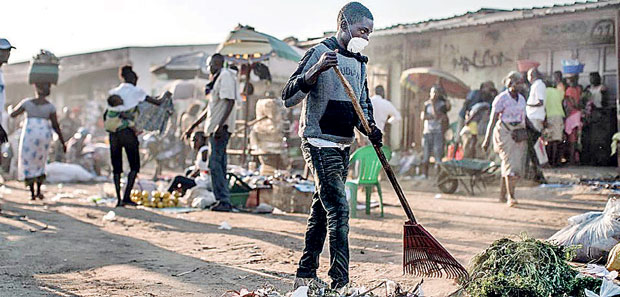18 Jan 2017 - {{hitsCtrl.values.hits}}

By Robbie Gramer
(c) 2016, Foreign Policy · ·
One might have thought that 2016 closed the door on the terrible Zika virus. But just weeks into a new year, Zika has reared its ugly head - this time in southwest Africa.
On Wednesday, Angola announced its first two cases of the virus. It’s doubly bad news for a country that is still recovering from both a cholera and a yellow fever epidemic that has killed hundreds. The two cases may not yet be cause for concern, but they’re an ominous reminder of how ripe the region could be for a widespread Zika outbreak.
“Up until two months ago, we didn’t have any detected case, but, now, we have two cases of Zika,” Health Minister José Luis Gomes Sambo said on Wednesday. “We have to take preventable measures, especially in the anti-vectorial fight against the mosquitoes,” he added.
One case was reportedly a French citizen on travel, while the other is a 14 year-old in the Angolan capital Luanda, World Health Organization (WHO) regional emergency director Socé Fall told Foreign Policy.
Even though it’s just two cases, health officials aren’t taking any chances. Fall said the WHO is working closely with Angola’s government to monitor the patient and investigate any new suspected Zika cases. After West Africa’s Ebola outbreak in 2014, international health experts are on edge. “We didn’t wait to react,” Fall said.
And for good reason. Luanda, with a dense population and poor infrastructure, is a ripe breeding ground for disease outbreaks, said New America’s Donna Patterson.
From there, the virus could spread like wildfire if uncontained.
“This [Zika] strain seems to be much more virulent than ones we’ve seen in the past,” Patterson told FP. “And if it turns from two cases to 20 or more rapidly, we know we have real cause for concern for Angola.”
A study in September 2016 found that over 2 billion people in Asia and Africa could be at risk of contracting the Zika virus in Asia and Africa, particularly in sub-Saharan Africa and southeast Asia. “Many countries in the region have weak health systems, including Angola,” Fall said. That makes it hard for developing countries to respond to outbreaks in time.
Angola has already learned that lesson the hard way. On Tuesday, the ministry of health said 106 people have died in a cholera outbreak since December. And a yellow fever epidemic killed 400 three months ago. (The yellow fever outbreak jarred the international community so badly that the WHO led a campaign to vaccinate over 12 million people in Angola and neighbouring Democratic Republic of Congo last year).
And disease isn’t the only struggle Angola’s beleaguered health sector faces. It also has steep funding problems. In March last year, Angola gutted public spending after laggard global oil prices stifled its economic growth (Angola, one of Africa’s largest petro-states, relies on oil for 95 percent of its government revenue). The spending cuts targeted vital government services like water sanitation, sewage, and health, which likely exacerbated the disease outbreaks.
In September 2016, the WHO declared an end to the global Zika emergency, though emphasized the virus remained a threat.
Before the new Angola cases, 69 countries and territories around the world reported cases of the Zika virus since the outbreak started in 2015, the WHO says, with most reported cases in Central and South America.
17 Nov 2024 19 minute ago
17 Nov 2024 2 hours ago
17 Nov 2024 3 hours ago
17 Nov 2024 3 hours ago
17 Nov 2024 4 hours ago